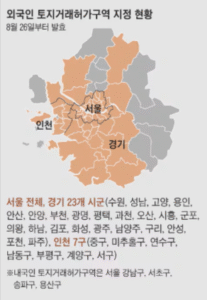
“D-8 Visa Application Essentials and Required Documents”
Korea has established various systems that allow foreign investors to engage freely in business activities, except in cases specifically restricted by law. Thanks to this investor-friendly environment, the amount of direct foreign investment has been steadily increasing.
In a previous article [Korea Visa #4], we covered an overview of the D-8 Investment Visa. In this post, we’ll detail the step-by-step process for obtaining a D-8 visa, which includes Foreign Investment Registration, Fund Transfer and Exchange, Company Formation and Business Registration, Foreign-Invested Company Registration, and D-8 Visa Issuance.
Check out the previous post!
[Korea Visa #1] Understanding Korean Visas Made Easy: The Ultimate Guide for Foreigners
[Korea Visa #2] Studying in Korea is Impossible Without This Visa! Essential Information for International Students
[Korea Visa #3-1] Succeeding in Professional Employment in Korea with the E-7 Visa Basic Principles and Key Occupations
[Korea Visa #3-2] How to Successfully Secure Professional Employment in Korea with the E-7 Visa: A Complete Guide to Eligibility Requirements and Essential Documents
[Korea Visa #4] The First Step to Successfully Settling in Korea: D8 Investor Visa
① Foreign Investment Registration
Foreign investors must register their investment upon entering Korea or through a domestic representative at a foreign exchange bank or Invest Korea. The bank will open a virtual account and issue a Foreign Investment Registration Certificate.
Required Documents: Passport copy if registering personally; notarized power of attorney and partnership agreement (notarized) if registering through a representative.
Investment Requirements:
- Corporations: Minimum of KRW 100 million per investor, with at least 10% ownership.
- Individuals: Minimum investment of KRW 300 million per investor.
- If there are two investors, the required amount doubles.
Important Notes:
Foreigners with a history of illegal entry or the use of false passports are not eligible for D-8 status. Additionally, foreigners who entered Korea on C-3-2 (Tourism), C-3-3 (Medical Tourism), D-3 (Industrial Training), E-9 (Non-professional Employment), E-10 (Seafarer Employment), H-2 (Working Visit), G-1 (Miscellaneous), or H-1 (Working Holiday) visas are ineligible for a D-8 visa. However, those on C-3-1 (Short-term Visit), C-3-4 (Short-term Business), C-3-8 (Korean Heritage Visit), C-3-9 (General Tourism), or with a Foreigner Registration Card may change to D-8 status within Korea.
② Investment Fund Transfer and Exchange

There are two primary ways to bring foreign investment funds into Korea: overseas remittance and hand-carrying.
- Overseas Remittance: Funds must be transferred to the virtual account opened in Korea. The sender, recipient, and investor names must match, with the purpose marked as “Investment Fund.” Funds can also be transferred in the name of a spouse or minor child, but not in the name of adult children or parents.
- Hand-Carrying: Declare the funds for business purposes at Incheon Airport customs to receive a Foreign Exchange Transaction Certificate, then deposit them into the virtual account. If converting to KRW, keep the Foreign Exchange Purchase Certificate.
Important Notes:
The investment process can proceed without the investor entering Korea, though this may result in the denial of company registration or a business permit. If denied, returning the investment funds to the original account could create responsibility issues.
③ Company Formation and Business Registration
Submit the required documents to the court registry for company formation, which takes about 2–3 days. A licensed administrative office like HELP PLUS can assist with this process.
Required Documents: Templates and lists of required documents are available on the Supreme Court’s online registry.
Certain business types, such as restaurants, require permits from local offices (e.g., district office, health center, or Ministry of Food and Drug Safety). Support from an administrative professional may be necessary if a Foreigner Registration Card is required.
Foreign investors often invest in fields such as cosmetics manufacturing/import, food production/import, medical device sales, e-commerce, restaurants, accommodation, health products, travel, foreign patient attraction, alcohol import, and recruitment services.
After completing company formation, register with the tax office for Corporation Registration and Business Registration within 20 days of business commencement. Additionally, open a corporate bank account, as additional bank accounts are restricted for 20 business days.
④ Foreign-Invested Company Registration and D-8 Visa Issuance

After company formation, apply for Foreign-Invested Company Registration with the bank used for the initial investment registration within 60 days of capital deposit.
Required Documents: Foreign Exchange Purchase Certificate, Business Registration Certificate, Passport, Foreign Exchange Transaction Certificate, and more.
Finally, apply for a D-8 visa. The duration of stay depends on the investment amount and business performance. Investment funds must be verifiable; funds transferred back to Korea from a Korean account sent abroad may result in visa rejection. Ideally, funds should be held in the investor’s home country for at least six months. Accepted sources include funds from property sales or formally inherited assets.
If the business aligns with a previously operated business abroad, the visa issuance process is often smoother. For example, a restaurant owner in Mongolia wishing to open one in Korea may find the visa application process expedited.
Required Documents for D-8 Visa Application
- Combined Application Form
- Original Passport and 1 Photo
- Foreign-Invested Company Registration Certificate Copy
- Business Registration Certificate (for Individual Businesses)
- Full Corporate Registration Certificate (for Corporations)
- Shareholder Statement
- Remittance Receipt (from the bank)
- Foreign Exchange Transaction Certificate (Customs Declaration at the Airport)
- Currency Exchange Certificate
- Office Lease Contract
- Business License (for applicable businesses, such as restaurants)
- Office Photos (3-5 images of signage, interior, and workspaces)
- Assignment Order and Employment Certificate (for corporate investors)
- Criminal Record Certificate (notarized, certified, consular confirmed, with increased KRW 1.5 billion requirement for public investment)
- Family Documents (for dependents – family relationship, marriage, and birth certificates)
- Tuberculosis Test Certificate (for certain countries)
- Statement of Investment Fund Usage and Receipts
- Statement of Source of Funds with Supporting Documentation
- Proof of Residence
Conclusion
Applying for a D-8 visa for foreign direct investment in Korea is detailed and complex. Insufficient preparation can lead to wasted time and costs. For a smooth experience, consider working with licensed administrative professionals who provide responsible support from start to finish. Thank you!
- https://blog.naver.com/celloberlin
- Kakao : phdcelloberlin
- Whatsapp : + 82 10-3174-3793
- celloberlin@naver.com









